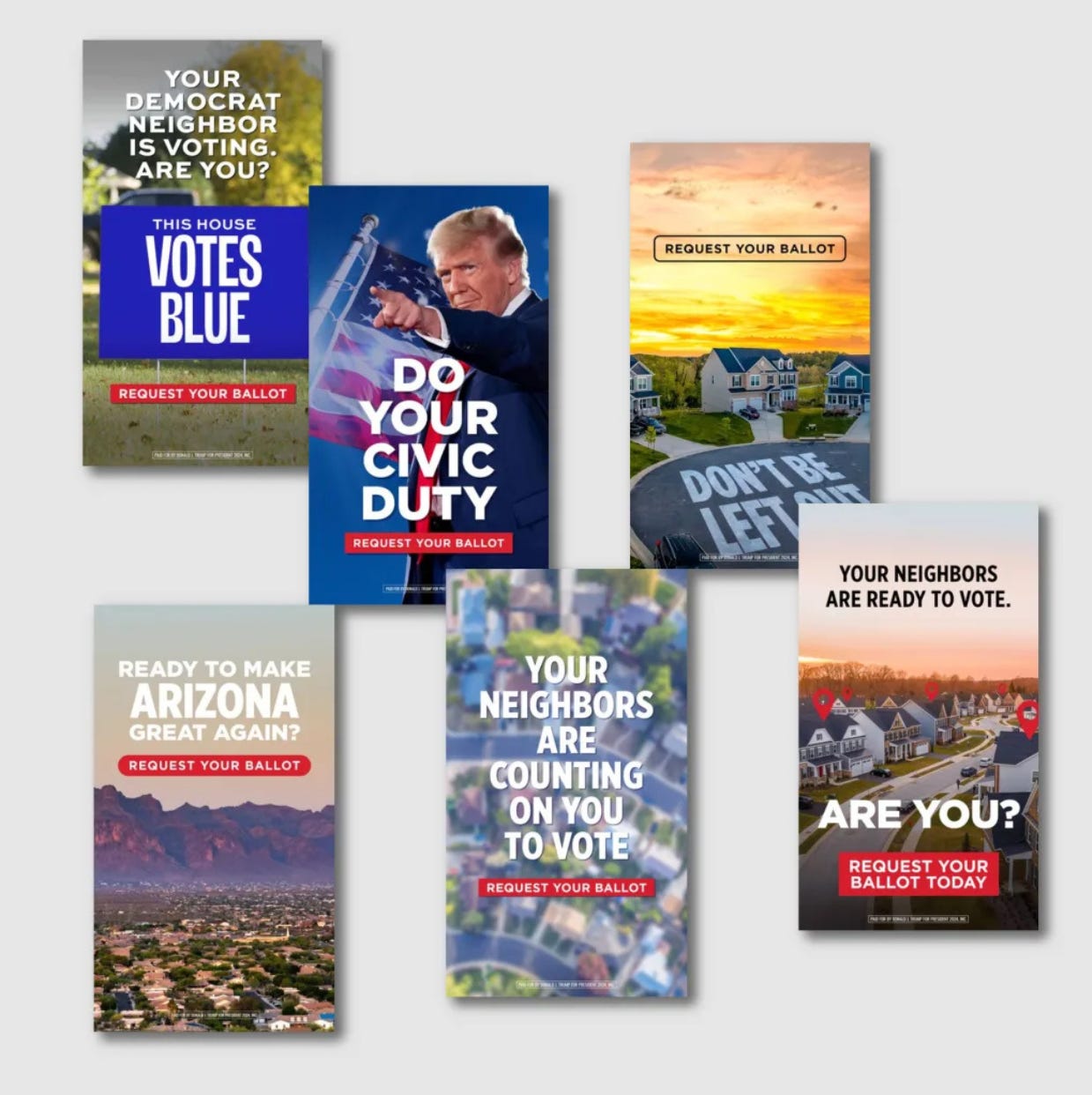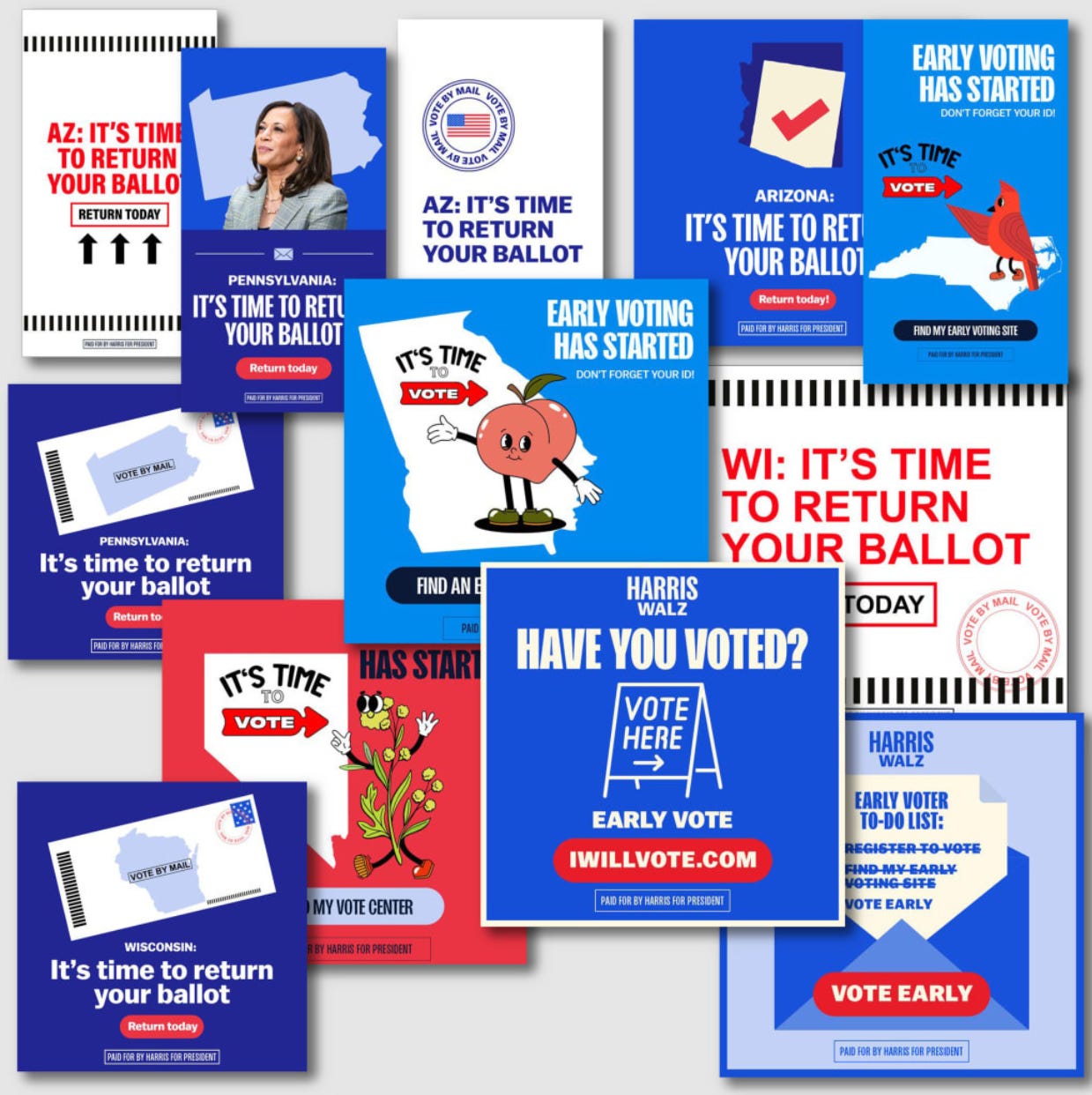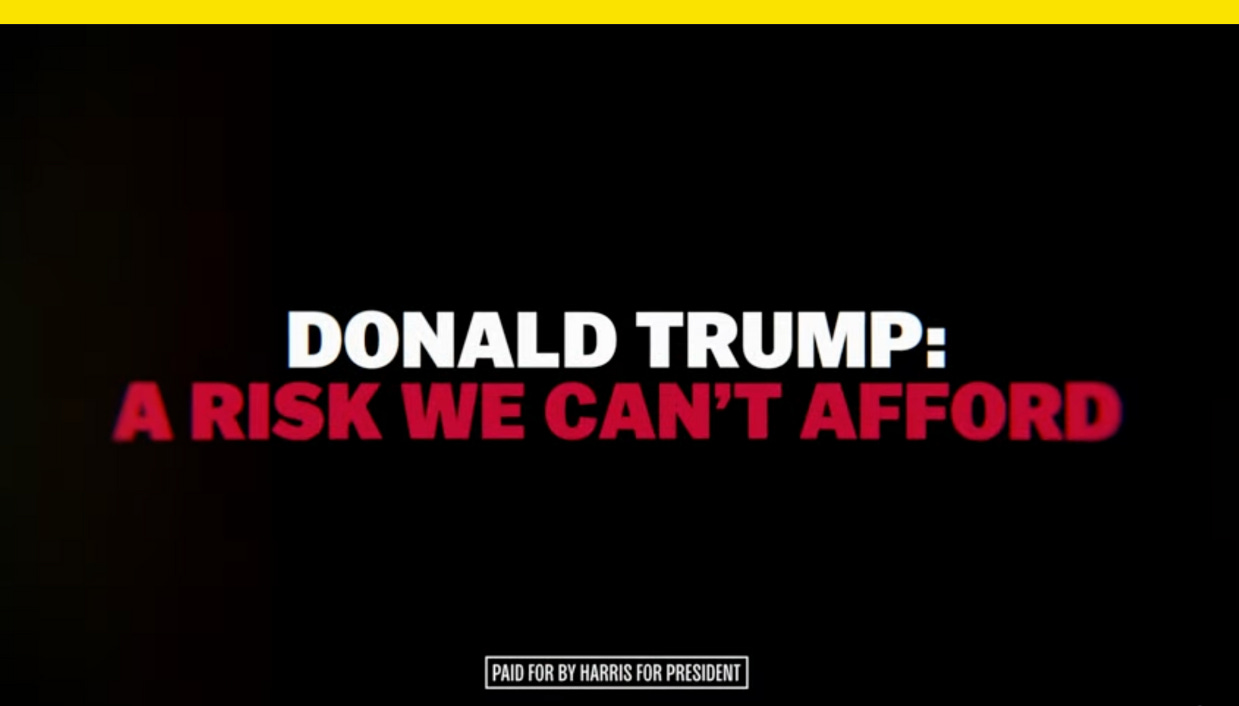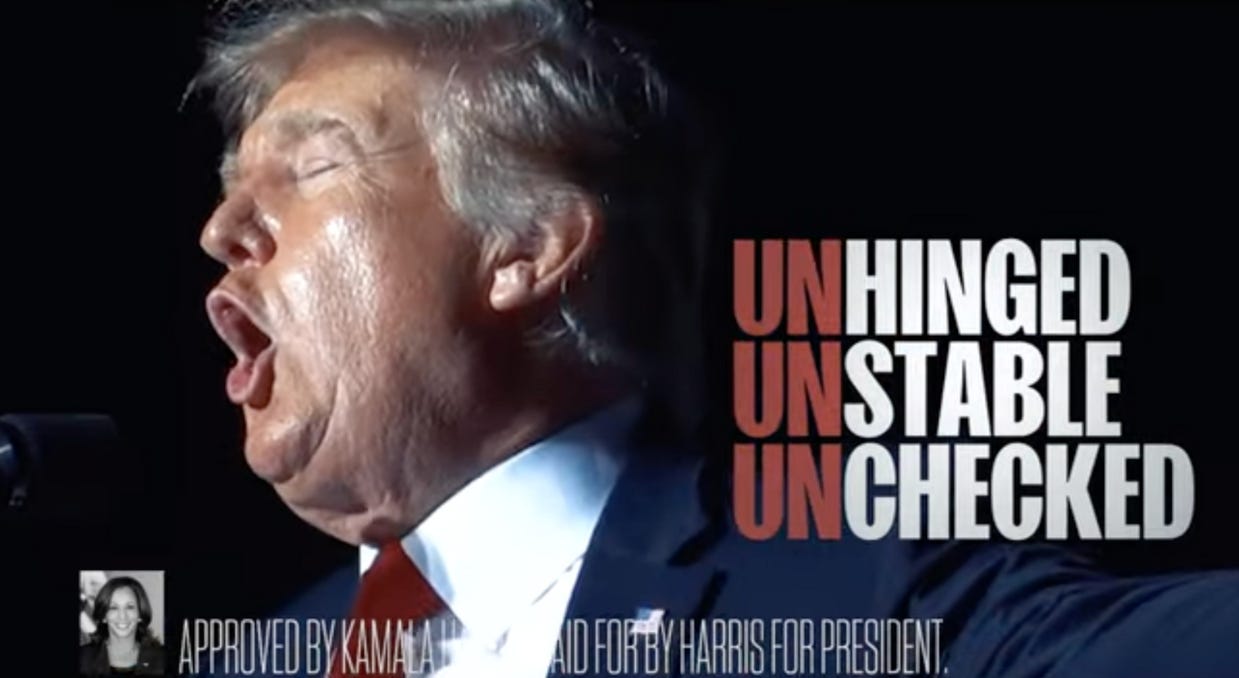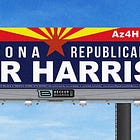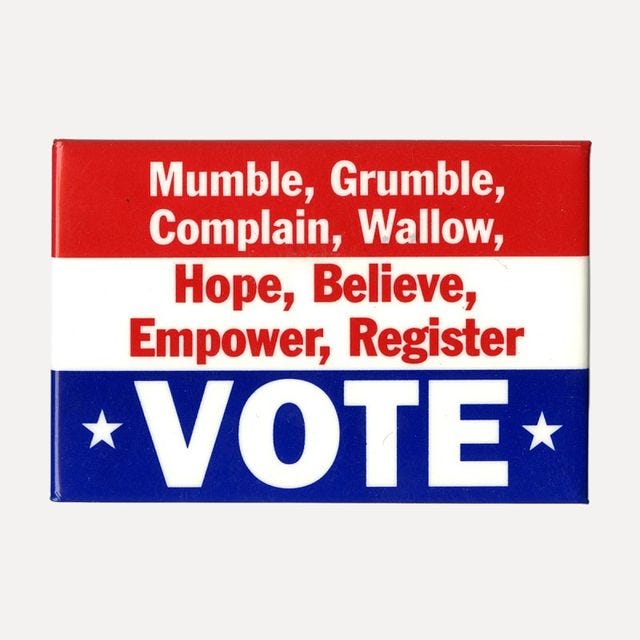Hello, in this issue we’ll look at how the Trump campaign’s attempt to guilt his supporters into voting by bringing up their neighbors could work and why the Harris campaign is cutting down on positive ads.
Scroll to the end to see: which candidate is outselling on Amazon 👀
Trump’s using peer pressure to get out the vote
Former President Donald Trump’s campaign is using some good, old-fashioned peer pressure to urge his supporters to vote for him by telling them that’s what their neighbors are doing.
The former president’s digital ads on Meta platforms in the swing states of Arizona, Georgia, Pennsylvania, and Wisconsin use images of suburban neighborhoods to encourage voters to request their ballots. “Your neighbors are ready to vote,” says one ad. “Are you?”
The ads, which started running earlier this month, offer variations on that theme. One reads, “Your Neighbors Are Counting on You to Vote” over a blurred overhead Google Maps-style view of a neighborhood. Another shows a blue yard sign that reads, “This House Votes Blue” in a tall, sans-serif font mimicking Vice President Kamala Harris’s campaign logo. “Your Democrat Neighbor Is Voting,” the ad reads. “Are You?”
These digital ads are all about nudging people to act based on social perception. The former ad’s message could be effective, for instance, with voters who have fellow Republican neighbors, because it acts as a reminder that elections are a group effort in which others are relying on you to participate. The latter version could sway Republican voters in Democratic-leaning neighborhoods because it suggests there’s a need to counterbalance their neighbor’s vote.
Research has shown that social pressure is an effective way to convince people to vote. A 2008 study published in the American Political Science Review analyzed how various mailers impacted voter turnout. The most effective mailer indicated whether members of the recipient’s household voted in previous elections—as well as whether their neighbors had. That message resulted in an 8.1 percentage-point gain over the control group, according to study.
Other mailers in the study that had increased turnout included one that showed only a household’s own voting record, and another that said “Do Your Civic Duty—Vote!” But none were as effective as the one that included a neighbor’s voting record. It turns out a little shame can go a long way toward getting people to cast their ballots, something the Trump campaign is looking to exploit.
The Harris campaign is running its own early-voting ads, including some that mimic the look of ballots, and others that are custom-designed to target specific swing states by integrating familiar symbols like a Georgia peach. Similarly, some of Trump’s suburban-themed get-out-the-vote ads are generic, while others target specific states. One such ad reads, “Ready to Make Arizona Great Again?” with a photo of suburban streets in the shadow of the mighty Superstition Mountains east of Phoenix.
It’s a nice local touch, but customized ads can go wrong. One previous voter registration ad by the Trump campaign that ran in Georgia showed an image of the country of Georgia, not the Southern swing state. When putting pressure on people to be civic minded and vote, you might want to get the neighborhood—let alone the state—right.
Harris is making her democracy argument
President Joe Biden ran on protecting democracy, an issue Harris hasn’t emphasized as heavily in her paid ads after taking his place on the top of the ticket. Increasingly, that’s begun to change.
Though Harris campaign ads are most focused on abortion (32%), women’s rights (30.4%), national defense (25.7%), and the economy (24.5%), according to data from the Wesleyan Media Project, her campaign’s advertising has grown more explicitly negative towards Trump in the final days before Election Day.
The Harris campaign’s ad “Total Power,” which is airing on television across all battleground states, says Trump “will ignore all checks that rein in a president’s power” if he’s elected. The ad opens with the Harris campaign slogan “A New Way Forward,” and a narrator says, “A second term, more unhinged, unstable, and unchecked.”
In “Enemy Within,” Harris’ campaign criticizes Trump by using his own words and the words of people who worked with him. The ad shows clips of recent Trump rallies where he made comments about the “enemy within.”
“A second term would be worse,” Kevin Carroll, a former Homeland Security Department official under Trump, says in the ad. “There will be no one to stop his worst instincts.”
The next scene shows Trump with his running mate, Sen. J.D. Vance (R-Ohio), as Carroll says, “Unchecked power, no guardrails,” a not-so-subtle reminder that the last guy who had the job, former Vice President Mike Pence, stood up for the Constitution and didn’t get a callback for the role.
Political ad messaging was shown to have grown more negative earlier this month, and at the presidential level, positive ads have now almost all but disappeared, according to the Wesleyan Media Project. That’s because there have been no positive pro-Trump ads the entire campaign (?!!!) and a once modest amount of positive pro-Harris ads has shrunk to barely a trickle.
“The decline in positive ads from Harris likely reflects the campaign’s sense that the outcome of the election will rest on swing voters still deciding between the two candidates,” Michael Franz, co-director of the Wesleyan Media Project, said in a statement. “Harris previously spent considerable sums re-introducing herself to voters. Now, her campaign likely sees the need to make comparisons with Trump and establish the high stakes at play.”
On Trump’s end, nearly all his ads mention taxes (98.5%), followed by his new second-most popular ad topic, gender identity (41.1%), then jobs (31.5%) and the economy (31.3%). As Trump makes a closing us vs. they/them argument, the progressive think tank Data for Progress argues voters don’t like it.
A 75% majority of U.S. likely voters “strongly” or “somewhat agree” that “transgender people deserve to be treated with dignity and respect,” a survey from the group earlier this month found, while 80% believe “both Democrats and Republicans should spend less time talking about transgender issues and more time talking about voters' priority issues like the economy and inflation.”
Have you seen this?
Is a lack of competition to blame for Republican fundraising woes? Democratic fundraisers have been spoiled for choice this cycle when it comes to payment processors. Republicans, meanwhile, were locked to one major platform, WinRed. [Campaigns & Elections]
Late lawsuit could shape political ad wars in final days of campaign. House Democrats are suing to stop Republicans from using a legal loophole to bolster their Senate candidates. [New York Times]
Trump merch is outselling Harris items on Amazon—but MAGA hats aren’t the top seller. According to one estimate, Amazon sellers made $140 million on Trump merch between April and September of this year. [Fast Company]
Children in Texas state representative’s latest campaign ad aren’t hers. In the ad, state Rep. Caroline Harris Davila, a Round Rock Republican, says she’s protecting “our future,” and she’s seen patting the smallest of four kids on the back while smiling and talking with the other three. [Texas Tribune]
History of political design
Brought to you by Whig, my new newsletter about politics, First Families, and pop culture. Subscribe here.
“Mumble, Grumble, Complain, Wallow, Hope, Believe, Empower, Register, Vote” button (undated). More than 35 million early votes have already been cast as of Friday afternoon, according to the University of Florida Election Lab. Early voting numbers have found Republicans have cut into Democrats’ early voting advantage.
A portion of this newsletter was first published in Fast Company.
Like what you see? Subscribe for more:
Politics in the front, pop culture in the back
Subscribe to my new free newsletter about politics, First Families, and pop culture:





